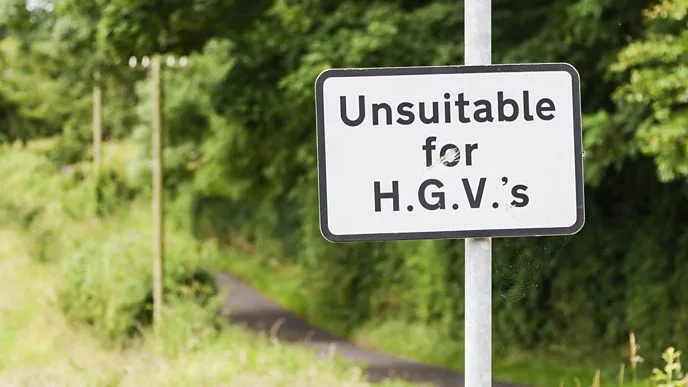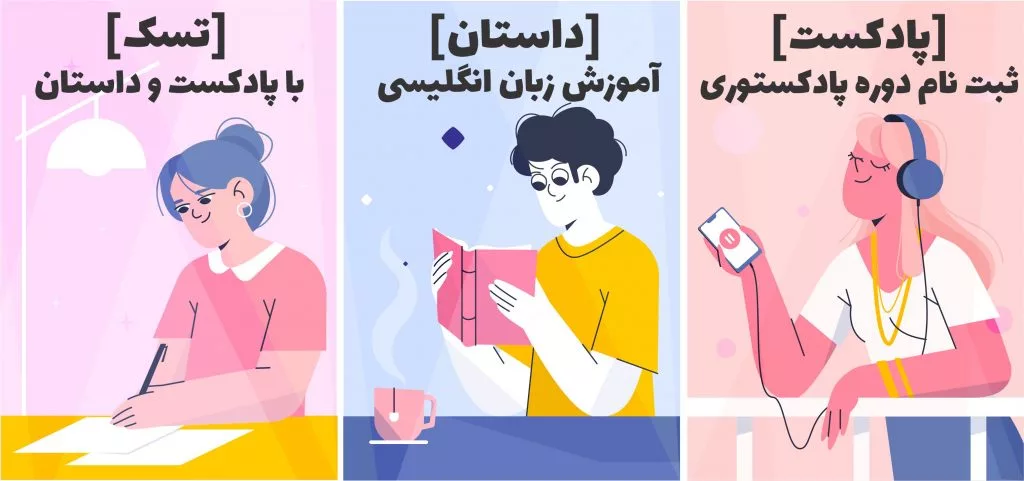پادکست انگلیسی BBC – افول آپاستروف
یه ژورنالیست بازنشسته که یه کارزار راه انداخته بود تا مردم رو به استفاده صحیح از آپاستروف (apostrophe) تشویق کنه دیگه داره از مبارزه در این راه دست میکشه. و اون هم به این خاطر که میگه “جهالت بازی رو برده.” تو چقدر موقع استفاده از آپاستروف، قوانین گرامری رو رعایت می کنی؟ اصلا به نظرت آپاستروف بخش مهمی از گرامر انگلیسیه؟ یا اینکه تو هم از اون آدمهایی هستی که از نظرت “we’re” و “were” هیچ فرقی ندارن؟ در پادکست انگلیسی BBC – افول آپاستروف می شنوی که علت افول استفاده از این علامت نگارشی چی بوده و چند کلمه جالب و کاربردی جدید هم یاد می گیری.
سوال پادکست انگلیسی BBC – کبوتر نامه بر :
The word ‘apostrophe’ itself – which language does it come from? Is it:
a)Latin
b) Greek
c) Arabic
به پادکست خوب گوش کن تا جواب رو پیدا کنی.
اگر می خوای گوش دادن به پادکست تا حد امکان برات ساده و کارآمد باشه مراحل زیر را دنبال کن:
هر روز به پادکست گوش کن. وقتی براش یه وقت ثابت در روز در نظر بگیری برات تبدیل به عادت میشه و این عادت هرروز پیشرفت میکنه.
پادکستی رو پیدا کن که موضوعش برات جالب باشه. وقتی از خود موضوع لذت ببری یادگیری هم برات لذتبخش میشه.
به پادکستی گوش کن که transcript یا متن داره. این بهت کمک می کنه تا کلمات و عبارات جدید رو به سرعت در متن پیدا کنی و ساختار انواع مختلف جمله رو خوب یاد بگیری.
پس از گوش دادن به پادکست با متن، در مرحله بعدی سعی کن بدون نگاه کردن به متن این کار رو انجام بدی. این کار مهارت شنیداری رو تقویت می کنه و کمک می کنه تا انگلیسی زبانان بومی را راحت تر درک کنی، حتی اگر خیلی سریع صحبت کنن.
اگه به پادکست انگلیسی گوش کردی و نتونستی کامل متوجه اش بشی، ناامید نشو. پادکست هایESL -English as Second Language بیشماری وجود دارن که برای سطوح مختلف، از ابتدایی تا پیشرفته طراحی شدن. مطمئنا هر روز می تونین یه پادکست مناسب با سطح خودت پیدا کنی.
فراموش نکن که هرچی بیشتر تمرین کنی در اون مهارت رشد میکنی! به قول انگلیسی ها: Practice makes perfect
واژگان کلیدی پادکست انگلیسی BBC - افول آپاستروف
| معنی به فارسی | معنی به انگلیسی | واژه |
| کسی که اشتباهات کوچیک نگارشی و گرامری اطرافیان رو میگه | Someone overly concerned with correcting small mistakes | a pedant |
| ماندن | to stay in a place longer | to linger |
| ( بی هدف ) حرکت کردن، پرسه زدن | to walk around with no real purpose or desire to get somewhere quickly | to wander |
| معلق، بلاتکلیف، نابسامان | at risk, possibly not going to happen | up inthe air |
| نادان، جهل، بیدانش، بیخرد | a lack of knowledge about something | ignorance |
| دارای تمدن بدوی، بیتمدن، وحشی | a primitive and uncivilized person | a barbarian |
BBC 6 minute English - The decline of the apostrophe

پادکست انگلیسی BBC - افول آپاستروف
Georgina
Hello. This is 6 Minute English, I’m Georgina
Rob
And I’m Rob
Georgina
Are you a punctuation pedant? Do you get upset, annoyed or angry if you see punctuation being used incorrectly – particularly apostrophes
Rob
Well, it depends. Usually I’m pretty chilled out about it, but sometimes, just sometimes it really winds me up. For example, if I see a sign for taxis at a train station and it says taxi – apostrophe – s – aargh! Why – why? The apostrophe is not used to show there is more than one, it’s used to show there is a missing letter or that the word is a possessive – it’s just wrong! So that does kind of make my blood boil
Georgina
So, when you say you’re pretty chilled about it you mean
Rob
OK, I’m not chilled at all. But maybe I wish I were
Georgina
Well, we’re going to be taking a look at reactions to the use and abuse of apostrophes in this programme. But first, a question. The word ‘apostrophe’ itself – which language does it come from? Is it
A: Latin
B: Greek
C: Arabic
What do you think, Rob?
Rob
I don’t think it’s Arabic, so it’s a toss-up between Latin and Greek. I’m going to say Greek
Georgina
OK. We’ll see if you’re correct at the end of the programme. The apostrophe, it is true to say, is often misused. It’s put where it shouldn’t be and not used where it should be. Is it important, though? Does it matter? After all, in spoken English there is no difference between ‘it’s’ with an apostrophe and ‘its’ without. ‘Your’ and ‘you’re’ – short for ‘you are’ sound the same. So what’s the problem in written English
Rob
In many cases there isn’t a problem at all. There would be very little confusion. But I don’t think that means we should just ignore the correct way to use them. Sometimes it can be very important to make clear if it’s a singular or plural or possessive. Another important thing to remember is that in CVs and job applications a good standard of spelling and punctuation is expected. Get it wrong and you could miss out on a good opportunity
Georgina
There is one group that has tried for nearly 20 years to keep others to these high standards – The Apostrophe Protection Society. They have publicly pointed out incorrect use in public signs and communications – a tactic that has not always been welcome or successful. But like the apostrophe itself, the group is in danger. Here’s a BBC news report on the subject
Duncan Kennedy, BBC reporter
They linger above our letters, they wander around the endings of our words, but apostrophes, it seems, are an endangered species. The Apostrophe Protection Society – yes there really is one – says their future is, well, up in the air
Georgina: How does he describe apostrophes?
Rob
Using metaphorical, poetic language, he says they linger above our letters. To linger is a verb usually used to describe someone or something staying somewhere before finally leaving
Georgina
So, we have apostrophes lingering above our letters and also he said they wander around the ending of words
Rob
Yes, also a metaphorical use. To wander means to walk slowly around without any real purpose or urgency
Georgina
And he went on to say that the future of the apostrophe is up in the air. When something is up in the air, it means its future is not certain, it’s not guaranteed. So if, for example, your holiday plans are up in the air, it means that there is some kind of problem and you might not be going on holiday after all. The person who founded The Apostrophe Protection Society is John Edwards. Now 96 years old he has decided to give it up. Partly because of his age, but also because he thinks that due to the impact of texting and social media he has lost the battle against bad punctuation. So why has it come to this? Here he is explaining why he thinks people aren’t bothered about using correct punctuation
John Edwards
I think it’s a mixture of ignorance and laziness. They’re too ignorant to know where it goes, they’re too lazy to learn so they just don’t bother. The barbarians have won
Georgina
So what’s his reason?
Rob
He blames ignorance and laziness. Ignorance is a lack of knowledge or understanding of something. So people don’t know the rules and are too lazy to learn them, according to Edwards
Georgina
Quite strong views there
Rob
Yes, and you thought I was a pedant! He actually goes further to say that the barbarians have won. Barbarian is a historical word for people who weren’t part of so-called civilized society. They were seen as violent and aggressive, primitive and uncivilized
Georgina
So it’s not a compliment then
Rob
Oh no!
Georgina
Right, before we review today’s vocabulary, let’s have the answer to today’s quiz. Which language does the word apostrophe come from? What did you say
Rob
I went for Greek.
Georgina
Congratulations to you and anyone else who got that right. Greek is the right answer. Now let’s remind ourselves of today’s vocabulary. First, what’s a pedant, Rob
Rob
A pedant is someone who corrects other people’s small mistakes – particularly in grammar and punctuation – but it’s not the same as an English teacher! A pedant will correct native speakers’ mistakes too, and not in the classroom
Georgina
To linger means to stay somewhere for longer
Rob
To wander is to walk around without a real purpose or intention to get somewhere quickly
Georgina
If your plans are up in the air, it means they are at risk and might not happen
Rob
Ignorance is the state of not knowing something that should be known
Georgina
And finally, a barbarian is a word for a primitive and uncivilized person. Right, we can’t linger in this studio as our six minutes are up. You can find more from us about punctuation and many other aspects of English online, on social media and on the BBC Learning English app. Bye for now
امیدوارم از پادکست انگلیسی BBC - افول آپاستروف لذت برده باشید.
گوش دادن به پادکست روش خوبی برای تقویت مهارت شنیداری و هم چنین یادگرفتن کلمات در بستر یک موضوع خاصه که این به تقویت مهارت مکالمه انگلیسی نیز کمک زیادی می کنه.
اگه تو هم از اون آدمهایی هستی که از گوش دادن به پادکست لذت می بره برات یه خبر خوب دارم! آموزشگاه مجازی آموزش زبان انگلیسی 24talk یه دوره طراحی کرده مبتنی بر پادکست و داستان کوتاه به اسم "پادکستوری - Podcastory". این دوره سعی کرده یادگیری زبان انگلیسی رو مناسب با نیاز و سطح زبان آموز به یه فرایند بسیار مفرح، موثر، سریع و کم هزینه تبدیل کنه.
همین الان می تونی با کلیک روی عکس زیر و ثبت نام در دوره ی آموزش زبان انگلیسی با پادکست و داستان ۲۴talk اولین و مهم ترین قدم رو برای یادگیری زبان انگلیسی برداری. وقت رو از دست نده!








